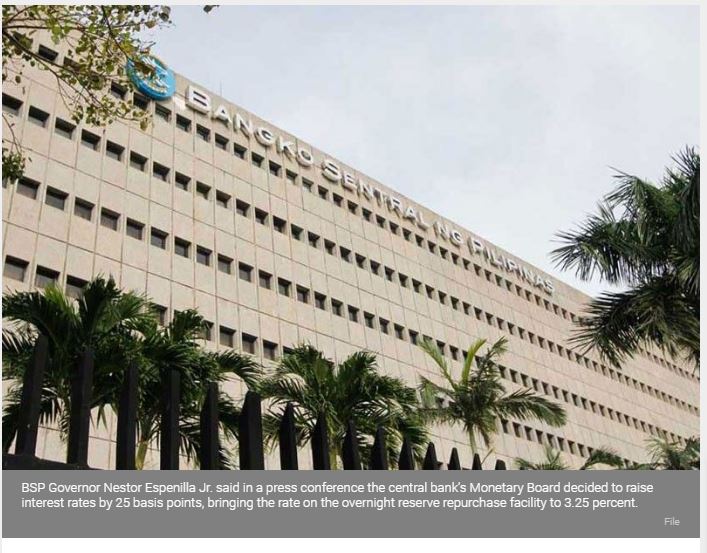Philippines: BSP hikes rates, first in more than 3 years
MANILA, Philippines — The Bangko Sentral ng Pilipinas (BSP) finally raised interest rates for the first time in more than three years yesterday, saying monetary authorities are ready to take further policy action to temper inflationary pressures.
BSP Governor Nestor Espenilla Jr. said in a press conference the central bank’s Monetary Board decided to raise interest rates by 25 basis points, bringing the rate on the overnight reserve repurchase facility to 3.25 percent.
The BSP last raised interest rates by 25 basis points in September 2014 and has maintained an accommodative policy stance through a low interest rate regime for more than three years to support the country’s growing economy.
Espenilla said the interest rates on the overnight lending and deposit facilities were likewise raised by 25 basis points.
Economists and analysts were expecting the BSP to raise interest rates as early as December last year or February this year as inflation continued to surge with the implementation of Republic Act 10963 or the Tax Reform for Acceleration and Inclusion (TRAIN) Law.
“We continue to see elevated risks and the Monetary Board basically decided that the time to act is now. And of course our own expectation is by acting right now in our view, a timely manner, we will avoid the necessity of further strong action down the road,” he said
Espenilla said the decision to raise the policy rate now serves as a signal that the Monetary Board has not forgotten its policy instrument that it will use it when it is necessary.
Espenilla said the Monetary Board noted that latest forecasts have further shifted higher, indicating that inflation pressures could become more broad-based over the policy horizon.
The Monetary Board raised its inflation forecast to 4.6 percent this year and to 3.4 percent for 2019 due to rising oil prices, higher transport fares in wages as well as the expected gain in domestic activity through faster gross domestic product (GDP) growth.
Inflation leapt to a fresh five-year high of 4.5 percent in April from 4.3 percent in March, bringing the average inflation to 4.1 percent in the first four months, exceeding the two to four percent target set by the central bank.
“While inflation momentum has started to slow down, inflation may still breach the inflation target range of two to four percent for 2018 due primarily to temporary supply-side factors. Nevertheless, inflation is expected to return inside the target range in 2019,” Espenilla said.
The BSP chief said the Monetary Board assessed that the balance of risks to the inflation outlook continues to lean toward the upside, with price pressures emanating from possible adjustments in transport fares, utility rates, and wages.
“Given these considerations, the Monetary Board believes that a timely increase in the BSP’s policy interest rate will help arrest potential second-round effects by tempering the buildup in inflation expectations,” Espenilla said.
According to Espenilla, strong domestic demand allows some scope for a measured adjustment in the policy rate without adversely affecting the country’s economic growth momentum.
The Philippines has booked 77 quarters of uninterrupted growth as the GDP grew faster at 6.8 percent in the first quarter of the year from the revised 6.5 percent in the fourth quarter.
He added monetary authorities would closely monitor domestic macroeconomic conditions, as well as the evolving global economic environment, including the potential impact of the ongoing normalization of monetary policy in some advanced economies, particularly the US.
The BSP chief said the central bank stands ready to undertake further policy action as necessary to ensure the achievement of its price and financial stability objectives.
“It is too soon to make that kind of statement in terms of how many more times and by what magnitude would be the total increase in interest rates. As you know, we have always ascertained that the BSP is evaluating the information flow and we are guided by data,” he said.
He added monetary authorities are monitoring how the external and domestic developments feed into inflation expectations, which is a driver of second round effects of the implementation of the new tax law.
Espenilla said the rate hike could also boost the peso which has weakened to a fresh 11-year low after breaching the 52 to $1 level this year.
“The rate hike could also help the exchange rate, although that is not the reason why we moved the interest rates,” he said.
Source: https://www.philstar.com/business/2018/05/11/1814036/bsp-hikes-rates-first-more-3-years#g3XtlHqUYlBptEjt.99


 English
English




